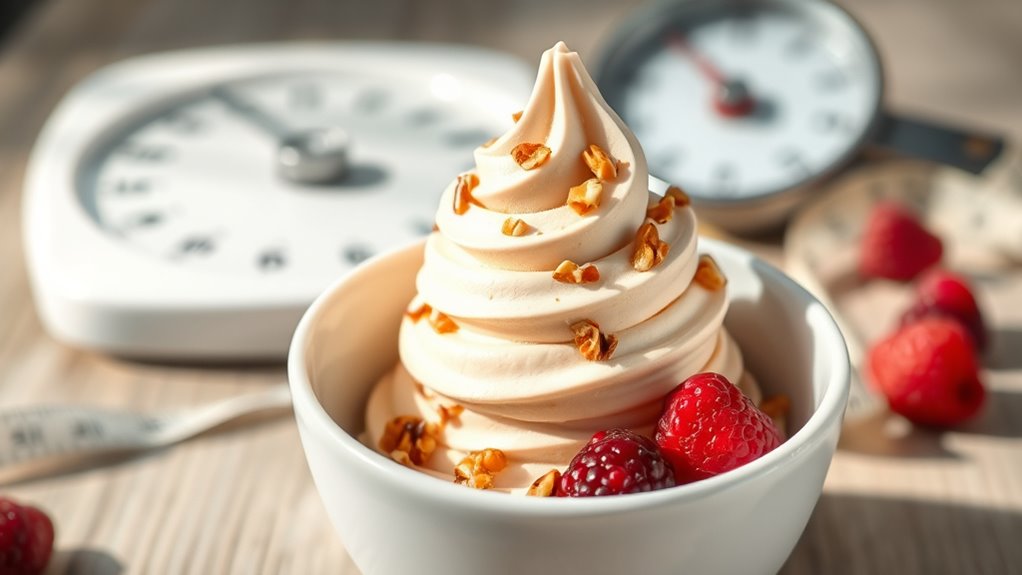Yes, you can enjoy ice cream while managing your weight! The key is moderation and mindful choices. Treat yourself occasionally to satisfy cravings, and balance it with healthier foods most of the time. Regular physical activity and portion control help maintain a healthy lifestyle. Ice cream can even trigger your brain’s reward pathways, making it a fun treat. Want to know how to make it fit into your diet effectively? There’s more to explore!
Key Takeaways
- Ice cream can be enjoyed in moderation, allowing for indulgence while maintaining a balanced diet.
- Adopting portion control helps prevent overeating while still enjoying treats like ice cream.
- Incorporating ice cream into a diet should be limited to about 20% of total intake for balance.
- Regular physical activity supports weight management even when consuming higher-calorie treats like ice cream.
- Focus on healthier foods 80% of the time to create a sustainable approach to weight loss alongside occasional ice cream enjoyment.
Understanding Ice Cream’s Nutritional Profile

When you dig into a bowl of ice cream, it’s important to understand what you’re eating. A cup of vanilla ice cream packs about 144.72 calories, along with 7.92g of fat, 2.52g of protein, and 16.99g of carbohydrates. You’ll find around 15.28g of sugar, contributing to its sweet flavor, but the fiber content is minimal at just 0.5g. Ice cream does offer some nutritional benefits, including calcium (92.16 mg) and potassium (143.28 mg), making it a source of essential minerals. Additionally, ice cream contains total saturated fatty acids of 4.89g, so moderation is key to maintaining a balanced diet. Moreover, moderate consumption of ice cream can enhance mood and provide a moment of enjoyment while still being mindful of overall caloric intake. However, keep in mind that not all ice cream is created equal. Premium varieties can be even higher in calories and fat, while low-fat options provide fewer calories but might also lack flavor. In fact, the U.S. is the largest consumer of ice cream worldwide, illustrating its popularity among diverse demographics. Consuming ice cream in moderation is particularly important for those concerned about heart health. Furthermore, some brands offer lower-calorie versions that cater to health-conscious consumers.
The Concept of Caloric Restriction

Caloric restriction, which involves reducing energy intake without sacrificing essential nutrients, plays a significant role in weight management and overall health. By cutting your daily calories by at least 10%, you can effectively manage your weight while still enjoying a balanced diet. This approach not only helps prevent obesity but also improves cardiometabolic health by lowering risks of diabetes and heart disease. Furthermore, it may enhance insulin sensitivity and reduce inflammation markers, making it easier to maintain a high vibrational energy during your weight loss journey. Incorporating a low carb diet can further support these health benefits while allowing for enjoyable treats like ice cream in moderation. However, it’s important to make sure you’re getting adequate vitamins and minerals to avoid malnutrition. Butter, for example, contains essential fat-soluble vitamins such as A, D, E, K that could support overall health when consumed wisely. Gradual adjustments, such as meal replacements or time-restricted eating, can make this lifestyle change easier. Research shows that caloric intake reduction of 20-30% may remedy aging-related diseases in humans, making it even more beneficial for long-term health. Additionally, understanding the legal process of divorce can provide clarity and support during emotionally challenging times, reinforcing the importance of self-care during weight loss. Always consider consulting a healthcare professional to guide you through the process safely and effectively.
Ice Cream’s Impact on Brain Reward Response

Ice cream triggers a powerful brain reward response that can make it hard to resist. The combination of fat and sugar releases dopamine, engaging your brain’s reward pathways similarly to addictive substances. When you indulge, regions like the orbitofrontal cortex evaluate its desirability, while the cingulate cortex processes your emotional reaction. The creamy texture further enhances this reward, activating your somatosensory system. However, frequent consumption can lead to reduced responsiveness in these reward areas, requiring more ice cream to achieve the same satisfaction. This reduced striatal response resembles patterns seen in addiction, making it clear that while ice cream offers pleasure, it can complicate your relationship with food and hinder weight loss efforts. To navigate this challenge, incorporating creative practice can help develop healthier habits and enhance self-discipline in your dietary choices. Furthermore, recognizing the importance of carrier oils in aromatherapy can provide a holistic approach to managing cravings and emotional eating. Additionally, understanding proper diet can further support your weight loss journey by providing healthier alternatives to satisfy cravings. Maintaining a balanced diet is crucial to achieve sustainable weight loss while still enjoying treats like ice cream.
Experimental Findings on Ice Cream Consumption

Studies often involve healthy-weight adolescents, utilizing fMRI to measure brain activity in response to eating ice cream. Researchers control for variables like body fat and other energy-dense foods to guarantee accurate results. Surprisingly, frequent ice cream consumption links to a reduced reward response, suggesting a specific sensory adaptation to this treat that doesn’t affect reactions to other foods like chocolate or cakes. Curiously, this response is independent of body fat levels. Notably, weight loss can occur even with a diet high in ice cream, as demonstrated by Anthony Howard-Crow’s unconventional diet experiment. Interestingly, Birthday Cake Ice Cream is a popular choice in such diets, combining enjoyable flavors with the potential for moderation. Additionally, maintaining a healthy diet may contribute to early detection of potential health issues, emphasizing the importance of awareness regarding food choices. For instance, including freshly squeezed juices in one’s diet can offer essential nutrients while enjoying sweet flavors. Furthermore, incorporating nutritional advantages of green juice can enhance overall health and support weight management. Data collection spans months or years, providing insights into long-term effects, though challenges remain in compliance and establishing realistic control groups for future studies.
Health Implications of Occasional Ice Cream Intake

While indulging in ice cream occasionally can bring joy, it’s essential to contemplate its health implications. Ice cream offers vitamins and minerals like calcium and vitamin D, beneficial for your bones and immune system. However, its high fat and sugar content can lead to weight gain and increased calorie consumption. Regular intake may harm your oral health, promoting cavities and weakening tooth enamel. Additionally, high sugar can disrupt sleep and negatively impact your cognitive function. While nutritional benefits exist, they are limited and should not be relied upon for daily nutrient intake. Moreover, consuming celery juice before indulging can enhance nutrient absorption and help balance out indulgent treats. Although occasional ice cream mightn’t be detrimental, 70% of chronic diseases may be preventable with proper nutrition, indicating that relying on it can affect your overall health. Balancing your indulgence with mindful dietary choices will help mitigate these risks while still allowing you to enjoy your favorite treats. Moreover, being aware of the essential oils’ benefits can enhance your overall wellness journey. Incorporating essential oils with natural antibacterial properties can further support your health during indulgent moments.
Strategies for Sustainable Weight Loss

Enjoying ice cream in moderation can fit into a balanced lifestyle, but if you’re aiming for sustainable weight loss, it’s important to focus on long-lasting changes.
Start by adopting a balanced diet rich in fruits, vegetables, and whole grains to stay full and reduce calorie intake. Lower calorie intake can be achieved by choosing whole grains over refined grains for better nutrition. Additionally, maintaining a healthy weight can be supported by regular physical activity. Including high protein breakfasts can also help you feel satisfied throughout the morning.
Adopting a balanced diet with fruits, vegetables, and whole grains helps you feel full while lowering calorie intake.
Make physical activity a priority; aim for at least 30 minutes of aerobic exercise most days and incorporate strength training twice a week.
Set realistic short-term goals to keep you motivated, and don’t hesitate to adjust them as needed.
Build a support network of friends, family, and professionals to enhance your journey.
Finally, manage stress and prioritize sleep to maintain a healthy weight effectively.
Balancing Treats Within a Healthy Diet

Balancing treats within a healthy diet is essential for maintaining both satisfaction and motivation during your weight loss journey.
A sustainable approach includes focusing on healthy foods 80% of the time while allowing treats like ice cream 20% of the time. This balance prevents feelings of restriction that can lead to frustration and diet abandonment. Additionally, nearly 75% of Americans are overweight or obese, highlighting the importance of finding a diet that works for individual preferences and lifestyles.
Portion control is vital; enjoying a small serving alongside healthier options, like fruit, boosts nutritional value. Timing matters too—enjoying treats after a meal can help prevent overeating.
Remember, indulging in moderation not only satisfies cravings but also enhances your diet’s enjoyment, making it easier to stick with in the long run.
Embrace this flexibility for lasting weight management success.
Frequently Asked Questions
Can Ice Cream Fit Into a Keto Diet Plan?
Yes, ice cream can fit into a keto diet plan if you choose the right options.
Look for keto-friendly varieties that use low-carb sweeteners like erythritol or stevia and high-fat bases such as heavy cream or coconut milk.
You can also make your own at home, allowing you to control the ingredients.
Just remember to keep an eye on portion sizes and verify it aligns with your daily macro goals.
Enjoy responsibly!
What Are Healthier Ice Cream Alternatives Available?
When you’re looking for healthier ice cream alternatives, consider options like Halo Top and Enlightened for low-calorie choices.
If you prefer dairy-free, try coconut milk or avocado ice cream.
Homemade versions, like peanut butter banana ice cream or sugar-free Greek yogurt ice cream, can also satisfy your sweet cravings.
Don’t forget nutrient-rich options like frozen Greek yogurt or yogurt parfait popsicles that offer protein and probiotics while tasting delicious!
How Often Can I Treat Myself With Ice Cream?
Did you know that occasional treats can actually help you stick to a healthy diet? You can treat yourself to ice cream about once a week without derailing your progress.
Just make sure it’s part of a balanced diet with plenty of fruits and vegetables. By limiting your indulgence, you’ll keep cravings in check and enjoy your treats guilt-free.
Does Ice Cream Cause Cravings for More Sweets?
Yes, ice cream can trigger cravings for more sweets. When you indulge in its sugary goodness, your brain releases dopamine, making you associate that pleasure with more sugary treats.
This can create a cycle where you find yourself reaching for additional sweets. Plus, the high sugar content can lead to blood sugar spikes and crashes, intensifying your cravings.
To manage this, try balancing your diet and practicing mindful eating to help control those impulses.
Can I Make Homemade Ice Cream Healthier?
Yes, you can make homemade ice cream healthier! Start by using natural sweeteners like honey or maple syrup instead of refined sugars.
Incorporate Greek yogurt for added protein and probiotics, and blend in fresh fruits for natural sweetness and fiber.
Opt for lower-calorie milks, like almond or low-fat dairy, to cut down on calories.
Finally, avoid artificial additives to guarantee a wholesome treat that satisfies without compromising your health.
Enjoy your creation!
Conclusion
Incorporating ice cream into your weight loss journey isn’t just a dream; it can be a delightful reality. Imagine this: savoring a scoop of your favorite flavor while still reaching your health goals. By understanding calories, enjoying treats mindfully, and balancing your diet, you can indulge without guilt. Remember, it’s not about rigid restrictions but finding joy in moderation. So go ahead, relish that creamy goodness—your taste buds and waistline can coexist happily!










